Protein is one of the most popular supplements on the market. We already know that supplementing with one of the best protein powders can help athletes gain muscle and recover from exercise. (1)(2) But did you know that protein supplements can also help individuals meet their everyday protein needs and even support weight loss? (3) The best organic protein powders may appeal even more to those looking to take a protein supplement on the daily.
There are different sources of organic protein, ranging from pea protein to whey protein. Some protein powders even contain micronutrients, probiotics, superfoods, and digestive enzymes. Thankfully, our team of expert product testers turned to some of the top brands to find the best organic protein powders in this review. Rest assured that all products we reviewed here boast 100-percent organic ingredients.
The 9 Best Organic Protein Powders of 2026
- Best Organic Protein Powder Overall: Transparent Labs Organic Vegan
- Best Organic Protein Powder for Athletes: Jacked Factory Authentic Vegan
- Best Tasting Organic Protein Powder: Onnit Plant-Based Protein
- Best Organic Whey Protein Powder: Legion Whey+
- Best Vegan Organic Protein Powder: Ritual Essential Daily Shake 18+
- Best Unflavored Organic Protein Powder: NOW Sports Certified Organic Whey Protein
- Best Gluten-Free Organic Protein Powder: Vega One Organic All-in-One Shake
- Best Organic Protein Powder for Weight Loss: Garden of Life Raw Organic Whey Protein
- Best Organic Protein Powder for Probiotics: Pure Food Plant-Based Protein Powder
Editor’s note: The content on BarBend is meant to be informative in nature, but it should not be taken as medical advice. The opinions and articles on this site are not intended for use as diagnosis, prevention, and/or treatment of health problems. It’s always a good idea to talk to your doctor before beginning a new fitness, nutritional, and/or supplement routine. Individual needs for vitamins and minerals will vary.
How We Tested and Chose the Best Organic Protein Powders
The BarBend team is made up of competitive athletes, certified personal trainers, and lifelong fitness enthusiasts. To determine the best organic protein powders available today, we’ve tested nearly 100 different profiles from the industry’s best brands, using a multi-point testing methodology to rate each profile on a scale of 1 (lowest) to 5 (highest). Below are some of the categories and components that played into our rankings.
Formula Quality
The products in this roundup typically have a short, pronounceable ingredient list, and easily-digestible protein sources, like whey, casein, or plant-based proteins. High-quality protein supplements should have a solid macronutrient profile consisting of high protein, low carbohydrates, and low fat. They should also contain micronutrients whenever possible to fill any gaps in individuals’ diets.
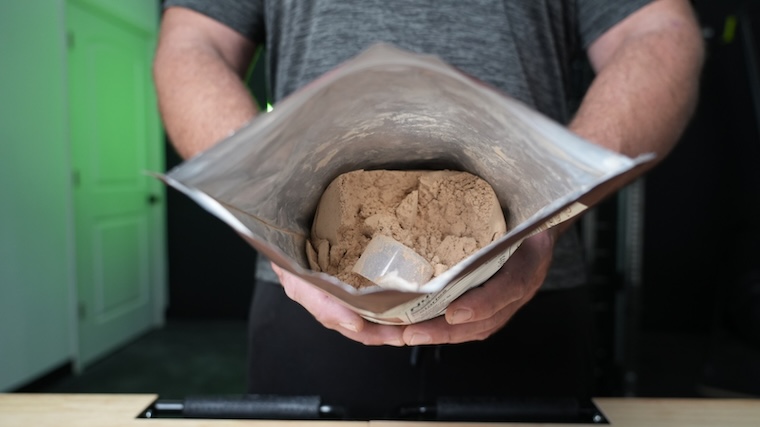
We tried to avoid supplements with excessive artificial ingredients, fillers, preservatives, sugar alcohols like erythritol, or added sugars. We also skipped any protein supplements that list any proprietary blends, as these don’t specify individual ingredient dosages. This makes it difficult to assess their effectiveness and safety.
Goals and Dietary Needs
There’s no one-size-fits-all when it comes to choosing the best organic protein powder. Some individuals might be looking for a protein powder that will support their athletic performance or weight loss, while others might be looking for one that meets specific dietary needs, like gluten-free or vegan.
However, in this process, we were also cautious of supplements that make unrealistic or miraculous claims about rapid muscle gain, fast recovery, extreme weight loss, or instant results.
Remember that supplements and their claims are not regulated by the Food & Drug Administration (FDA), so it’s important to read the nutrition label and ingredient list. If it’s too good to be true, it probably is.
Taste and Flavor
While unrelated to health benefits, try to choose a taste or flavor that you enjoy so that you can consistently use the product and enjoy using it.
Some protein powders offer only chocolate or vanilla flavors, while others offer many decadent flavors to choose from. We’ve sampled different flavors and listed out the ones available for each of our picks on this list. You may see some crossover between this list and our picks for the best-tasting protein powders.
Mixability
Again, while unrelated to health benefits, no one likes clumping at the bottom of their shaker bottle. Some tend to mix better in water, while others mix better in milk or non-dairy beverages, like oat milk.
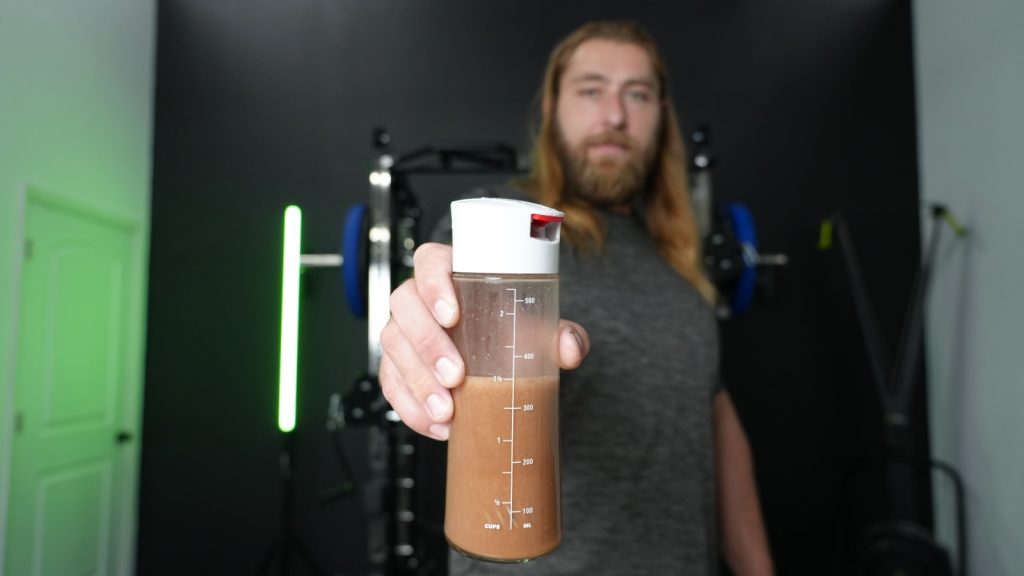
Our BarBend product testers have tested the products on this list in water, smoothies, food, and dairy and non-dairy bases to ensure that we can recommend protein shakes that are highly soluble. So, most of the products you’ll see on this list mix well in a shaker bottle.
Credibility
Ask yourself the following questions: Have you heard of the brand? Has the product gone through third-party testing via organizations like NSF to ensure they meet quality and safety standards?
A good product will boast third-party certifications on the product label that vouch for their credibility. This is important because supplements are not regulated by the FDA.
Best Organic Protein Powder Overall: Transparent Labs Organic Vegan
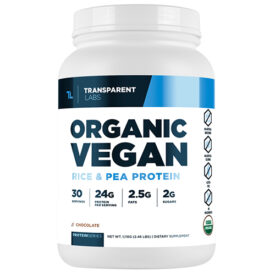
A surprisingly delicious vegan protein powder that's totally free from artificial ingredients and soy, Transparent Labs Organic Vegan Protein contains a 2:1 ratio of rice to pea protein powder, and four grams of fiber.
Specs
- Price Per Serving: Starting at $1.50
- Protein Per Serving: 24g
- Protein Source: Organic rice protein, organic pea protein isolate
- Calories Per Serving: 130 to 150, depending on flavor
- Third-Party Testing: Yes (Analytical Resource Laboratories)
- Available Flavors: French Vanilla, Chocolate
Pros
- This pick contains 24 grams of organic plant-based protein per serving, which is a good value for your money and high for an organic and vegan protein powder.
- Its ingredient list is short and simple — no artificial sweeteners or colors.
- It’s gluten-free and non-GMO.
- Transparent Labs Organic Vegan protein contains 4 to 5 milligrams of iron, which is 20 to 30 percent of the daily value for this nutrient.
Cons
- Neither flavors taste or smell too great compared to other picks on our list.
- The sodium content in this protein can be higher than desirable for those watching their sodium intake, with 260 to 300 milligrams of sodium per serving (15 percent of the daily value).
- With only two flavors available – French vanilla and chocolate – you’re limited in options if you don’t like either of those.
Sure, the best organic products don’t have to be vegan, but here, Transparent Labs Organic Vegan hits both notes. It’s perfect for organic-conscious athletes looking for a protein powder that will support muscle growth. When your goal is to gain muscle, you may need a lot more protein than the average individual — anywhere from 1.2 to 1.6 grams per kilogram per day. (5) For example, a 200-pound adult needs 145 grams of protein per day, and this supplement can help you meet your protein goal. This pick gives you a lot of bang for your buck with 24 grams of totally organic, vegan protein per serving.
[Related: New Study on Protein Timing: Even 100 Grams Per Meal Isn’t Wasted]
With a short and simple ingredient list, Transparent Labs has created a simple, no-fluff organic protein — we rated it 4 out of 5 for formulation. Additionally, if you are following a vegetarian or vegan diet, iron is a micronutrient that’s often deficient. (6) BarBend expert reviewer Chelsea Rae Bourgeois says, “I like that you can meet 30 percent of your daily iron needs with one serving.”
However, the sodium content can also be on the higher side for those watching their sodium intake for general wellness or blood pressure. “It also contains 260-300 milligrams of sodium per scoop, which isn’t a crazy amount, but it does account for around 15 percent of the recommended daily sodium intake,” Bourgeois adds.
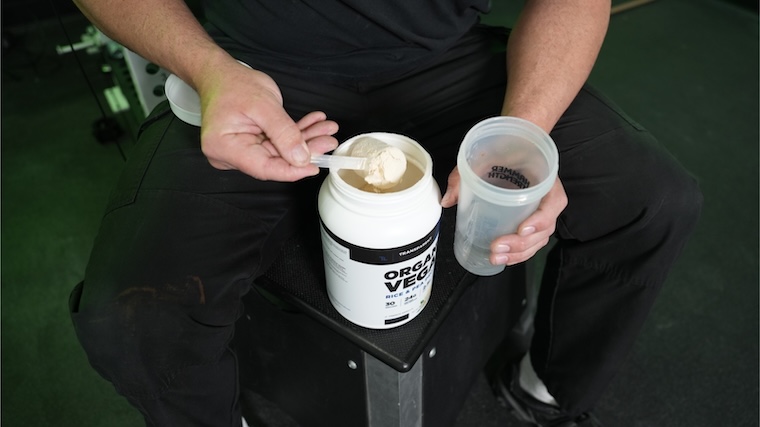
As far as taste goes, it’s a little on the earthy side, so we scored it a 2 out of 5. Our tester, who tried the Chocolate flavor, states, “Not too bad for an organic protein powder. It tastes like a dark chocolate drink (not milk chocolate), but with an earthy hint because of the rice and pea protein. I would not suggest this for people who like sweet/sugary protein drinks. There is not that much sugar and you can really taste the cocoa powder.”
This product is also third-party tested through Analytical Resource Laboratories, with its certificate of analysis posted publicly on the Transparent Labs website. This helps ensure its purity, safety, and quality.
Read our full Transparent Labs Organic Vegan Protein Review.
Best Organic Protein Powder for Athletes: Jacked Factory Authentic Vegan
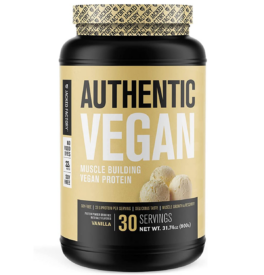
Jacked Factory's Authentic Vegan protein powder is just about the closest formula to whey protein we can find when it comes to macros. The big appeal of this protein powder, to us, is the price. For what it offers, this vegan product is one of the most affordable we've found.
Specs
- Price Per Serving: $1.16
- Protein Source: Organic pea protein isolate, sunflower seed, organic pumpkin seed, watermelon seed, mung bean
- Protein Per Serving: 22g
- Calories Per Serving: 110
- Third-Party Testing: No
- Available Flavors: Vanilla, Chocolate
Pros
- Jacked Factory Authentic Vegan protein powder contains five premium protein sources to help athletes meet their protein needs and the full spectrum of essential amino acids.
- It’s free from chemicals, fillers, soy, and artificial food dyes.
- This pick is an economical option, especially for a vegan protein supplement.
Cons
- Jacked Factory Authentic Vegan protein powder doesn’t mix well with water, even in a shaker bottle.
- It’s a little earthy in taste and is also sweetened with stevia extract, which can taste bitter to some people.
- It’s limited in flavor offerings – you only have the option of vanilla or chocolate.
Athletes – look no further. Jacked Factory Authentic Vegan is one of the best vegan protein powders we’ve tested. Studies show that protein supplementation may not necessarily benefit someone who is sedentary, but can help accelerate muscle and strength gains in athletes. (7) This means that as an athlete, you may consume more protein throughout the day than the average individual and many options out there can be expensive or have too many “extra” ingredients, leaving you feeling not at your best.
First, for an athlete, the protein source matters. This product contains a diversified plant protein source to help meet your complete essential amino acid needs, which vegan protein powders often lack. Consuming a product with complete protein is important for athletes because this means that the protein powder contains all the amino acids needed to make new protein in the body, which is essential for muscle gain and recovery. (8) We scored this product a 4 out of 5 for its high-quality formulation.
Second, this supplement is also free from food dyes, chemicals, and fillers, making it an excellent choice for athletes looking for a clean vegan protein powder with a high amount of protein. Although this product isn’t third-party tested, it is manufactured in a GMP-certified facility, which helps ensure its purity and potency. This is important for athletes because a product needs to be free of any banned substances in order for them to compete in their sport.
However, this product didn’t score as strongly on practical factors like taste and solubility – with a score of 2 out of 5 on solubility and 3 out of 5 for taste. Our tester states, “I wasn’t super impressed with the taste and mixability, but I appreciate that the protein powder was easy on my stomach.”
Even with a shaker bottle, there were clumps at the bottom of the cup. “I saw a thick layer of protein powder that settled at the bottom of the shaker bottle, despite multiple attempts to shake it,” our tester adds.
[Related: How Much Protein Do You Need for Bodybuilding?]
Best Tasting Organic Protein Powder: Onnit Plant-Based Protein
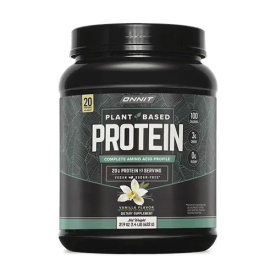
Onnit's plant-based protein powder is made of a blend of pea, pumpkin, sunflower seed, and watermelon seed proteins. This one is available in two separate flavors, too, including Chocolate and Vanilla.
Specs
- Price Per Serving: Starting at $1.91
- Protein Source: Pea protein concentrate, pumpkin seed, sunflower seed, watermelon seed
- Protein Per Serving: 20g
- Calories Per Serving: 100
- Third-Party Testing: Yes (Informed Sport)
- Available Flavors: Vanilla, Chocolate
Pros
- Known for its great taste, Onnit Plant-Based Protein contains avocado powder to improve its mouthfeel, flavor, and texture, and monk fruit for natural sweetness.
- This pick features Smooth Protein™, which is a blend of seed proteins that make it highly soluble.
- Due to its protein blend containing pea, pumpkin, sunflower, and watermelon seeds, this product contains all essential amino acids (EAAs).
Cons
- It’s limited in flavor options, with only chocolate or vanilla available to choose from.
- While monk fruit is a natural sweetener with a milder taste, this product also contains stevia, which can impart a bitter taste.
- It’s one of the pricier options in the market.
Plant-based protein powders aren’t exactly known for their great taste – they can taste earthy, bitter, or beany, especially compared to their whey counterparts. However, if we had to pick a powder solely based on its taste, we’d choose Onnit Plant-Based Protein – it’s actually good. Our testers rated it an impressive 4.75 out of 5 for taste. It’s only offered in vanilla and chocolate flavors, but who needs more flavors when the ones available are both delicious?
[Related: Vegan Diet for Athletes]
Our tester also scored this formulation a solid 4 out of 5. Although Onnit Plant-Based protein consists of plant protein, its protein sources are diversified, so it contains all EAAs to support vegetarian and vegan diets that might be lacking in certain amino acids. In addition to being a great option for vegan diets, it’s dairy-free, gluten-free, soy-free, and contains no sugar. It’s also slightly sweetened with monk fruit and stevia extract. While stevia can sometimes impart a bitter aftertaste, this doesn’t seem to detract from the product’s amazing taste.
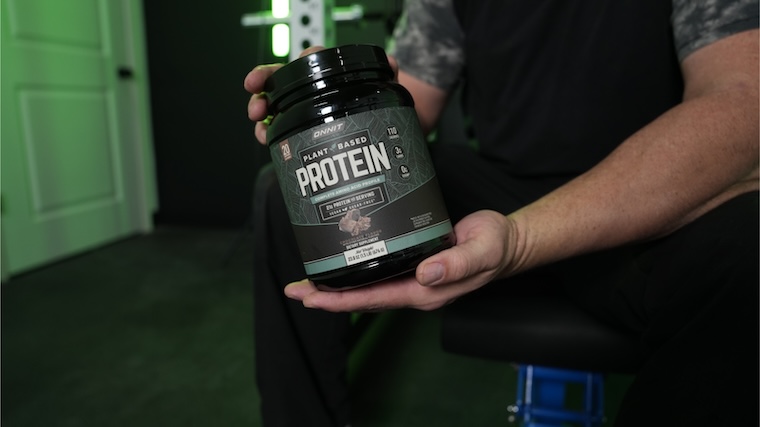
Additionally, it’s fairly mixable in water or a blender bottle – our product tester gave pretty high marks for this product on solubility, with a score of 4.25 out of 5.
Read our full Onnit Plant-Based Protein Review.
Best Organic Whey Protein Powder: Legion Whey+
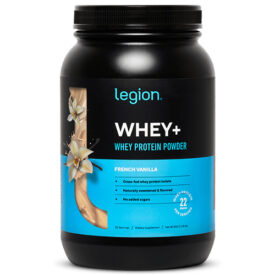
An all natural, non-GMO, fat-free whey that's cheaper than many competitors, Legion Whey Isolate Protein Powder is made from 100 percent grass-fed whey protein isolate from sustainable dairy farms in Ireland. It's also higher in calcium compared to other powders on the market.
Specs
- Price Per Serving: Starting at $1.52
- Protein Source: Whey protein isolate
- Protein Per Serving: 22-23g
- Calories Per Serving: 100-110
- Third-Party Testing: Yes (Labdoor)
- Available Flavors: Dutch Chocolate, Chocolate Hazelnut, Cinnamon Cereal, Apple Pie, Banana Bread, Birthday Cake, Chocolate Peanut Butter, Cocoa Cereal, Cookies & Cream, French Vanilla, Fruity Cereal, Honey Cereal, Mocha Cappuccino, Salted Caramel, Strawberry Banana, Unflavored
Pros
- Legion Whey protein comes in 16 different flavors for the flavor enthusiast.
- It doesn’t contain any artificial sweeteners, flavors, or food dyes.
- It boasts an excellent macronutrient profile – no fat, low carbohydrates, and high in protein.
- This pick is third-party tested through Labdoor and produced in facilities that are NSF-certified, FDA-inspected, and GMP-compliant.
Cons
- Some flavors are high in potassium, which could be an issue if you are taking other electrolyte supplements or beverages.
- It’s sweetened with stevia, which can have a bitter aftertaste to some individuals.
Legion Whey+ is our favorite pick out of organic whey proteins because it consists of whey protein isolate as its protein source. Whey protein isolate undergoes further processing, removing more fats, carbohydrates, and lactose, thus “isolating” the whey. This results in a product with a higher protein concentration (usually around 90 percent or higher) and minimal lactose content. Whey+ is one of the best whey isolates we’ve tested.
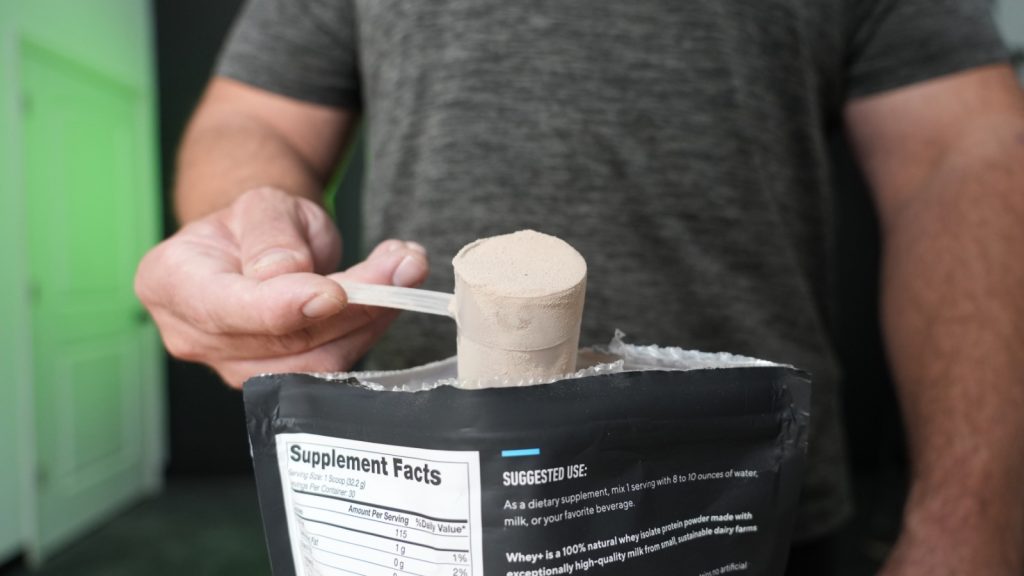
Whey isolate is excellent because it tends to be more nutrient-dense than whey protein, making it a popular choice among individuals with lactose intolerance or those seeking higher protein content per serving. Compared to whey, isolate is also more readily digestible. (9) Additionally, studies show that consuming whey protein isolate can help improve muscle mass and strength while reducing body fat. (10) Chelsea Rae Bourgeois, M.S., R.D.N., L.D. states, “Whey+ is clinically dosed to support muscle building and workout recovery. Its macro ratios and ingredient sources are impressive.” Our team of testers scored this pick a 4.75 out of 5 for its formula.
As far as taste goes, our tester scored this product a sparkling 4.5 out of 5 after trying the Cinnamon Cereal and Dutch Chocolate flavors. “I tried the Dutch chocolate flavor and it honestly tasted great, (if anyone has ever had ovaltine before it tasted very similar), was a pleasant chocolate flavor sweetened with stevia, definitely not too sweet,” he states.
[Related: How to Clean Your Protein Shaker Bottle]
He also loved the Cinnamon Cereal flavor, saying, “It kind of tasted like when you first start eating a bowl of cinnamon toast crunch and the cereal hasn’t had a chance to fully incorporate into the milk yet. The flavor’s there but not quite as pungent as I would’ve liked.” Legion Whey+ also offers variety for those who get bored of vanilla or chocolate flavors with 16 different flavors available.
Legion Whey+ is also third-party tested through Labdoor and produced in facilities that are NSF-certified, FDA-inspected, and GMP-compliant. This helps ensure the purity and quality of the product since supplements aren’t closely regulated.

However, when we worked with an accredited, third-party lab to test more than 150 protein powders for accuracy and purity, Legion landed in the top 50 percent of all tested supplements for heavy metals. As such, we graded them a C.
Read our full Legion Whey+ Review.
Best Vegan Organic Protein Powder: Ritual Essential Daily Shake 18+
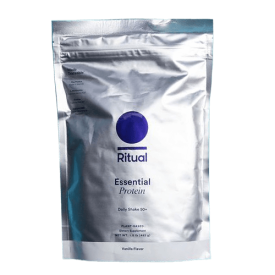
This clean, transparent protein powder relies on organic, non-GMO yellow peas for its 20-gram protein dosage. Additionally, the subscription-based model helps ensure you’re always stocked up to help you meet your nutritional goals day in and day out.
Specs
- Price Per Serving: Starting at $2.13
- Protein Source: Pea protein
- Protein Per Serving: 20g
- Calories Per Serving: 115
- Third-Party Testing: Yes (Informed Sport)
- Available Flavors: Vanilla
Pros
- 100% of its ingredients are traceable, so that you know what you’re putting in your body.
- Ritual Essential Daily Shake 18+ mixes well, which is especially important for a plant-based protein shake.
- The formulation contains a complete amino acid profile, with 8 grams of EAAs and 4 grams of BCAAs.
Cons
- The sodium content can be a little higher than desired for those watching their sodium intake, with 290 milligrams of sodium per serving.
- Its packaging can be hard to seal, since protein gets stuck in it.
- It’s one of the most expensive pea protein options on the market.
Ritual Essential Daily Shake 18+ is a clean and traceable plant-based protein shake that’s ideal for vegan diets. First, it’s completely plant-based, while so many options out there are made with whey. Ritual is made with American peas and naturally sweetened with organic monk fruit extract, which has less of an aftertaste than stevia.
Second, although pea protein on its own is not complete in the ratios needed to be considered a true “complete protein”, this product contains L-methionine. Complete proteins can be helpful for general wellness since they contain all the amino acids to maintain lean muscle. (8)
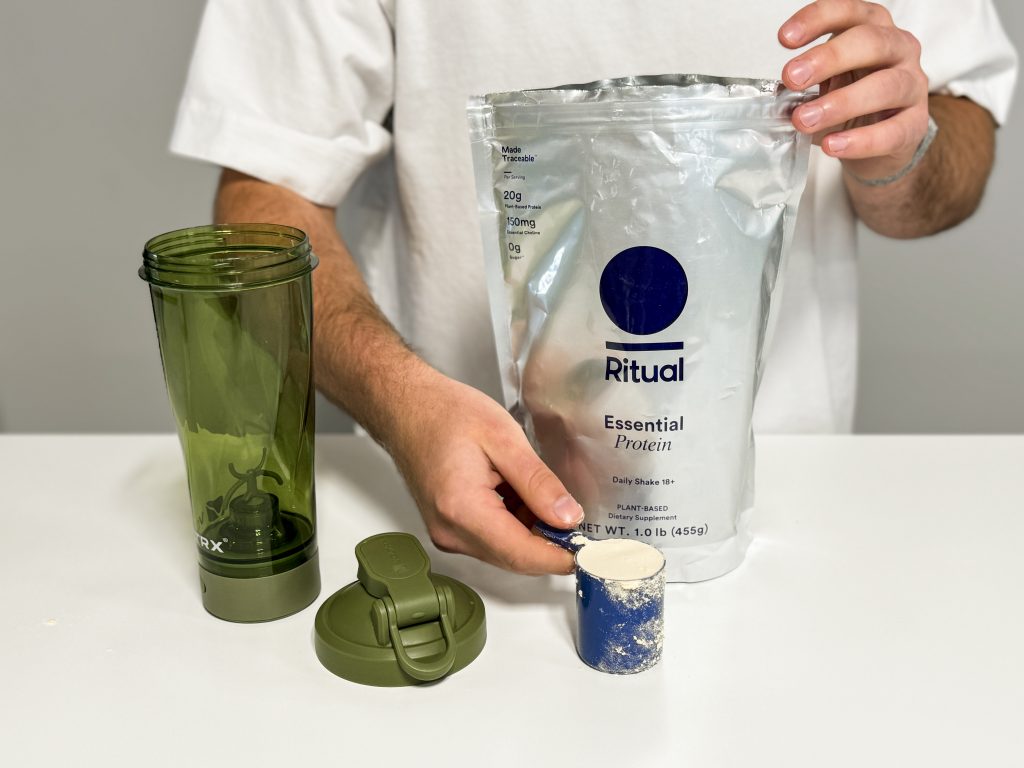
Chelsea Rae Bourgeois, our expert reviewer, states, “I like the formula’s macro ratio, but I especially like that Ritual added L-methionine to make it a complete protein. Methionine is an essential amino acid, meaning our bodies need it but can’t produce it, so it’s super convenient to get it in your protein powder.” Overall, this formulation scored a 5 out of 5 from our testers.
Another important factor for vegans when selecting a protein powder is the consistency and solubility of the shake. Specifically, many vegan protein shakes are clumpy and don’t mix well, which can be a challenge for meeting protein needs. However, this pick seems to boast a smooth consistency and texture. “This has a shockingly great consistency. Mixed in water, it dissolves, and it also has a really smooth texture. It’s not thick, but it’s not watery like some proteins are,” our tester states. Overall, we scored this product a 5 out of 5 for solubility.
This pick is also third-party tested through Informed Sport, so you can trust its purity and quality – which is important since supplements are not regulated by the FDA. There’s also a certificate of traceability on this specific product that you can find on the Ritual website.
[Related: Best Clean Protein Powders]
Best Unflavored Organic Protein Powder: NOW Sports Certified Organic Whey Protein
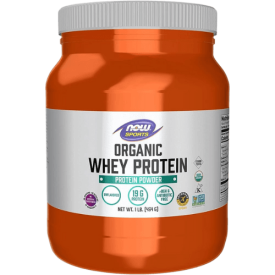
NOW Sports Certified Organic Whey Protein only contains one ingredient: unflavored whey protein concentrate. It’s extensively third-party tested and is a cost-effective option for athletes.
Specs
- Price Per Serving: $1.44
- Protein Source: Whey protein
- Protein Per Serving: 19g
- Calories Per Serving: 100
- Third-Party Testing: Yes (Informed Sport)
- Available Flavors: Unflavored
Pros
- The only ingredient in this product is organic whey protein concentrate and it comes unflavored.
- This product contains naturally occurring branched-chain amino acids (BCAAs) that may support recovery after exercise.
- It’s extensively third-party tested and produced in a GMP facility.
- This organic protein powder is cost-effective, at only $1.44 per serving.
Cons
- This pick is unflavored, so it won’t taste great on its own.
- It’s not available in multiple flavors, unlike other protein supplements.
If you’re looking for an unflavored, organic whey protein powder that is well-suited for athletes, look no further. It contains a single ingredient: organic whey protein concentrate. No fluff.
Those looking for an unflavored protein powder might be looking for an easy product to integrate into recipes, and this unflavored product fits the bill from a taste perspective. Our tester states, “If you want something to make smoothies with or bake with, I think this is a good option. It doesn’t have a taste that would overpower any other flavors you use it with.” However, if you’re a protein powder flavor enthusiast, this product may not be the best choice for you – our tester rated its plain taste a 3 out of 5.
Mixability is also equally important for an unflavored protein powder so that you don’t end up with clumps in the recipe. “No issues blending — in a shaker cup by itself, it dissolves pretty well. And then in a blender you don’t notice it at all,” our tester adds, giving the product a 5 out of 5 for solubility.
Additionally, NOW Sports Certified Organic Whey Protein is third-party tested through Informed Sport, and is certified USDA Organic. The Informed Sport certification is particularly important in the world of sports nutrition, since it checks the product for over 220 banned substances that might prohibit an athlete from competing in their sport. You can even view the testing results online. This product is also produced in a GMP facility, which means that it has been tested for stability, potency, and product formulation.
[Related: How Much Protein Do You Actually Need Per Day?]
Best Gluten-Free Organic Protein Powder: Vega One Organic All-in-One Shake
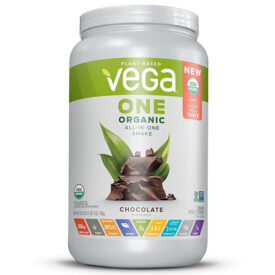
This plant-based shake boasts 140 calories, 20 grams of protein, and an ample amount of the antioxidants Vitamins A, C, and D — which help boost your immune system and fight inflammation.
Specs
- Price Per Serving: Starting at $3.80
- Protein Source: Pea protein
- Protein Per Serving: 20g
- Calories Per Serving: 140 to 150
- Third-Party Testing: USDA Organic, Non-GMO Project Verified
- Available Flavors: Berry, Mocha, Plain Unsweetened, French Vanilla, Chocolate Mint, Coconut Almond, Chocolate
Pros
- If you’re sensitive to gluten or have celiac disease, Vega One Organic All-in-One Shake is one of the few gluten-free options out there.
- This vegan protein powder contains high quality ingredients like fruits and sprouted veggies.
- Vega contains no fillers, no artificial sweeteners, no preservatives, and no added sugar.
- This pick contains probiotics and 6 grams of fiber per serving to support healthy digestion.
Cons
- Despite containing many important nutrients, it’s low in certain nutrients like calcium, magnesium, and potassium.
- Vega uses stevia leaf extract to sweeten this pea protein powder, which can have a bitter aftertaste to some individuals.
- It’s expensive for what you get.
Vega One Organic All-in-One Shake is safe for gluten-free diets, as it has avoided cross-contamination with wheat allergens during its production process. Adhering to a gluten-free diet through consuming naturally gluten-free foods and certified processed gluten-free products is critical for those living with celiac disease or are sensitive to gluten. (11)
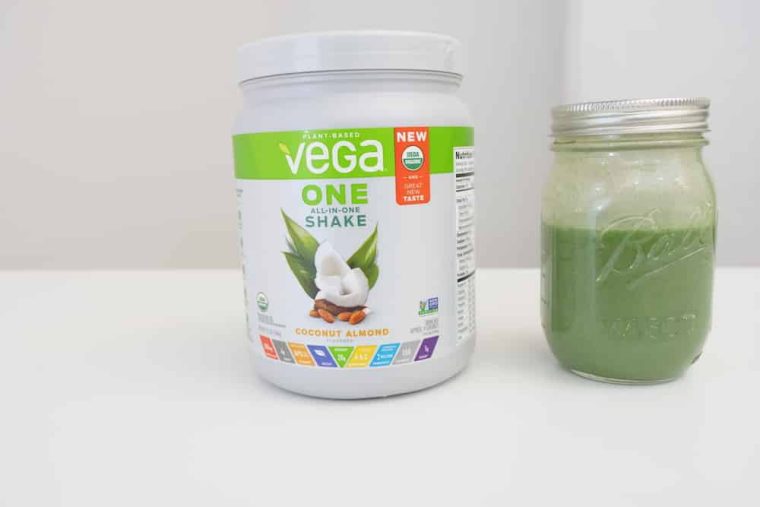
It’s also packed with nutritious, gluten-free ingredients. BarBend expert reviewer Chelsea Rae Bourgeois scored the formulation a 4.5 out of 5. “Vega One Organic All-In-One Shake is a plant-based protein powder that prioritizes whole food ingredients to provide a hefty dose of protein and other nutrients in every scoop,” she says. “It boasts an impressive ingredient profile. With ingredients like sprouted quinoa, a fruit and veggie blend, and pea protein, it’s rich in fiber and many important vitamins.”
[Related: High-Protein Vegetables]
This pick can also help support digestion for those with celiac disease who are looking for digestion-friendly products. First, it contains probiotics (Bacillus subtilis), which can help promote a more balanced microbiome. (12) “I also love that it contains probiotics to support a healthy gut,” Bourgeois adds. It would be helpful to know the probiotics concentration in this product, but it was not noted anywhere on the label.
Second, it also contains 6 grams of fiber, which is helpful in meeting your daily dietary fiber needs of 25 grams for women and 38 grams for men according to the USDA Dietary Guidelines. (13)
According to our testers, Vega One Organic All-in-One Shake also scored pretty high in taste with a score of 4 out of 5 and solubility, with a score of 4 out of 5. However, it tends to be on the pricier side, so if you’re not strictly adhering to a gluten-free diet, you might be able to find better options on this list that fit your needs.
Read our full Vega One Organic All-in-One Shake Review.
Best Organic Protein Powder for Weight Loss: Garden of Life Raw Organic Whey Protein
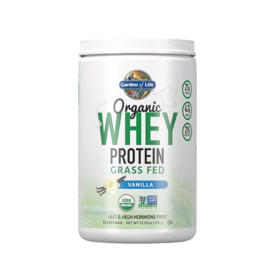
Garden of Life Raw Organic Whey Protein offers 21 grams of whey protein sourced from American Humane Certified grass-fed cows, as well as 2 billion CFU of probiotics to help aid digestion.
Specs
- Price Per Serving: Starting at $2.87
- Protein Source: Organic whey protein concentrate
- Protein Per Serving: 21g
- Calories Per Serving: 120
- Third-Party Testing: USDA Organic, Non-GMO Project Verified
- Available Flavors: Vanilla, Chocolate, Chocolate Peanut Butter, Unflavored
Pros
- The organic whey protein concentrate is cold-processed to maintain the integrity of the amino acids.
- It contains no artificial sweeteners, artificial flavors, antibiotics, hormones, or pesticides.
- This pick contains 2 billion CFUs of probiotics to support a healthy gut, which may in turn, help with weight loss.
Cons
- Garden of Life Organic Whey is low in vitamin and mineral content, with only 6% daily value for calcium and 2% daily value for potassium.
- It’s low in dietary fiber content with only 1 to 2 grams per serving.
If you’re looking for an organic protein powder for weight loss, Garden of Life Raw Organic Whey Protein checks off all the boxes: solid macronutrient profile, low in calories, and contains 2 billion CFUs of probiotics (Bifidobacterium lactis).
First, this pick is high in protein with 21 grams of protein, low in fat with 2 grams of fat, and low in fat with 6 grams of carbs – making it a great macronutrient profile for those looking to lose weight. Many people with a weight loss goal follow a higher protein diet with lower fat and carb content, so this pick fits those criteria. (14)
According to Garden of Life, their organic, grass-fed whey protein is cold-processed, which maintains the structure and integrity of the essential amino acids instead of denaturing them in the production process.
Second, digestion support is important for those looking to lose weight. Probiotics are helpful for promoting a healthy gut, and this pick supplies 2 billion CFUs of probiotics. (12) Emerging research also shows that gut bacteria may play a role in weight loss. (15) However, for weight loss purposes, it would have been nice for this product to contain a little bit more dietary fiber to support satiety and digestion.
[Related: Best Probiotic Supplements]
Third, this product is fairly low in calories with 120 calories per serving. People with a weight loss goal are looking for a calorie deficit, so having a lower calorie count from a protein supplement can be helpful.
Additionally, we like this Garden of Life offering due to its transparency and purity. We worked with an accredited, third-party lab to test more than 150 protein powders for accuracy and purity, and Garden of Life landed in the top 10 percent overall, earning an A.

Taste is also an important consideration when you’re trying to lose weight but consume foods that taste good. “The taste was earthy, but less so when mixed with any kind of milk,” our tester notes, giving it an overall 3.5 out of 5. It also received a solid solubility score of 4 out of 5.
Best Organic Protein Powder for Probiotics: Pure Food Plant-Based Protein Powder
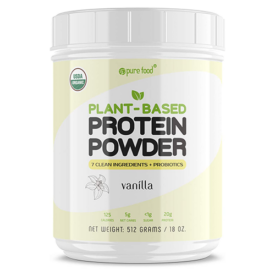
With one billion colony forming units (CFUs) of probiotics, Pure Food's vegan protein powder should be your pick for more optimal gut health. This powder also contains 20 grams of protein and four grams of BCAAs.
Specs
- Price Per Serving: Starting at $1.66
- Protein Source: Organic peas, brown rice, hemp, chia seed, pumpkin seed
- Protein Per Serving: 10-11g
- Calories Per Serving: 60-85
- Third-Party Testing: No
- Available Flavors: Chocolate, Vanilla, Raw Cacao
Pros
- This protein powder contains 1 billion CFUs of probiotics and a high protein digestibility-corrected amino acid score to support a healthy gut.
- This pick meets many dietary restrictions including vegan, paleo, keto, gluten-free, dairy-free, and soy-free.
- It contains no added sugar, no fillers, no heavy metals, and no other additives.
Cons
- Compared to other protein supplements, its amount of protein is low at only 10-11 grams.
- It’s low in calories, so other ingredients are needed to bulk up its nutrition profile.
- This pick isn’t third-party tested.
Looking for an organic protein shake that also supplies probiotics? Check out Pure Food Plant-Based Protein powder. This product contains 1 billion CFUs of probiotics and a highly digestible amino acid profile to support individuals who are looking for a protein shake for digestive support. Probiotics are helpful for promoting a healthy gut, as they help provide good bacteria to your gut microbiome. (12)
[Related: Best Probiotic Supplements for Women]
However, given that many individuals choose this product for its probiotic content and for digestive support, it could also benefit from the addition of more dietary fiber and digestive enzymes to provide further digestive support. (4) Its current formulation only contains 3 grams of fiber, while the USDA recommendation for fiber is 25 grams for women and 38 grams for men. (13) You could certainly mix this powder into a smoothie with some fruits and chia seeds for extra fiber content, though. It mixes well in water or in a smoothie, with a solubility score of 4 out of 5.
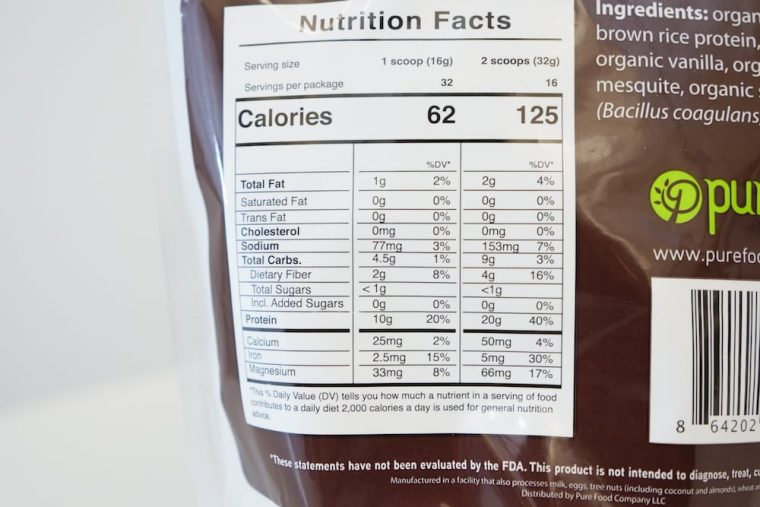
Pure Food Plant-Based Protein Powder also doesn’t have enough protein per serving for it to be a standalone protein shake, with only 10-11 grams of protein per serving. It’s also low in calories at 60-85 calories per serving. Chelsea Rae Bourgeois, M.S., R.D.N., L.D. states, “I’d recommend individuals to add other ingredients to bulk up its nutrition profile.” Overall, our tester scored this product a 3.5 out of 5 for its formulation.
Read our full Pure Food Plant-Based Protein Powder Review.
Benefits of Organic Protein Powders
While the recommended dietary allowance (RDA) for a sedentary adult is about 0.8 grams per kilogram of body weight, individuals may need more protein depending on their activity level and goals. (13) For example, some recent research points to higher protein needs of up to 1.6 grams per kilogram of body weight when you’re trying to build lean muscle mass. (5) These are the individuals who will reap the most health benefits of organic protein powders.
Helps Build Muscle and Support Recovery
Organic protein powders can be a convenient and concentrated source of protein for people looking to build muscle and support muscle recovery after exercise. These benefits of protein supplementation apply whether you’re an active individual or a competitive athlete.
Protein powders are helpful because they’re rich in essential amino acids – and amino acids are the building blocks of protein. Protein intake can promote muscle protein synthesis by reversing the muscle damage caused by exercise and promoting the growth of new muscle tissue. (1)(2)
Helps Meet Your Protein Intake Goals
Protein powders are a versatile and convenient way to supplement your diet and meet your protein intake goals with additional protein without having to consume a lot more food. Whether you’re looking to increase your protein intake due to higher activity levels, training for a marathon, or looking for strength gains, taking a protein supplement can help you meet your goals.
A 2023 study found that supplementing with protein may help reduce body mass index (BMI), waist circumference, and percentage of body fat in participants. These results suggest that meeting protein goals through foods and protein supplements can be an effective strategy for weight management and improving overall metabolic health. (16)
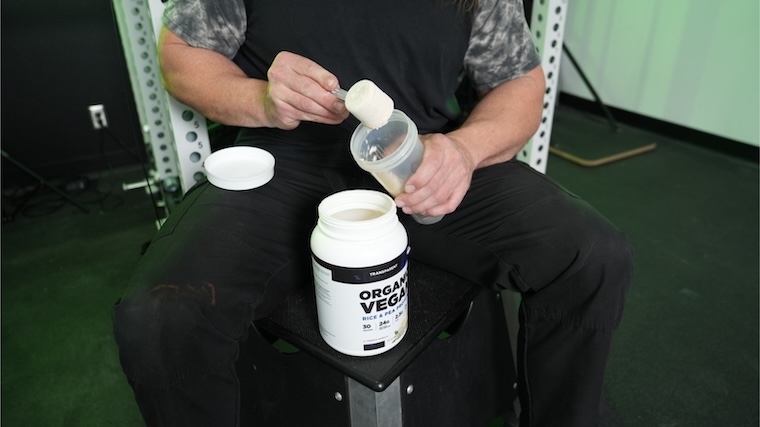
However, remember that protein supplements are intended to supplement, not replace. When possible, individuals should aim to obtain nutrients from whole food sources as they provide a wider range of essential nutrients such as dietary fiber, vitamins, and minerals, that are beneficial to meeting your nutrient needs. Whole foods also contain other macronutrients beyond just protein to help achieve a balance of carbs, fat, and protein.
Supports Satiety and Fullness
Protein has a more significant satiety effect than fats and carbohydrates. (17) This means that you’ll feel fuller for longer between meals if you incorporate protein into your diet. Results from a 2022 study showed that a high-protein diet was more effective than a low-protein diet in promoting weight loss by reducing food intake due to a higher satiety index. (18)
Protein also has a higher thermic effect of food (TEF) than carbohydrates and fats. This means that a more significant proportion of the calories from protein are used in the process of digesting and metabolizing the protein rather than being stored as fat. This higher TEF of protein can lead to increased energy expenditure, which better supports weight loss goals.
[Related: Best Supplements for Weight Loss]
How Much Do Organic Protein Powders Cost?
When taking into consideration what organic protein powders cost, it’s important to look at the price per serving rather than the price per tub or price per scoop. That’s because different tubs have different numbers of servings – and a serving can be a single scoop or multiple scoops depending on the product.
To look at the cost per serving, you’ll need to compare the cost of the container to the number of servings that the tub contains. For organic protein powders, the cost ranges from $1 to $4 per serving depending on the brand and ingredients.
| Best Organic Protein Powder Overall | Transparent Labs Organic Vegan | Starting at $1.50 per serving |
| Best Organic Protein Powder for Athletes | Jacked Factory Authentic Vegan | $1.16 per serving |
| Best Tasting Organic Protein Powder | Onnit Plant-Based Protein | Starting at $1.91 per serving |
| Best Vegan Organic Protein Powder | Ritual Essential Daily Shake 18+ | Starting at $2.13 per serving |
| Best Organic Whey Protein Powder | Legion Whey+ | Starting at $1.52 per serving |
| Best Unflavored Organic Protein Powder | NOW Sports Certified Organic Whey Protein | $1.44 per serving |
| Best Gluten-Free Organic Protein Powder | Vega One Organic All-in-One Shake | Starting at $3.80 per serving |
| Best Organic Protein Powder for Weight Loss | Garden of Life Raw Organic Whey Protein | Starting at $2.87 per serving |
| Best Organic Protein Powder for Probiotics | Pure Food Plant-Based Protein Powder | Starting at $1.66 per serving |
The cost per serving for an organic protein powder can depend on the protein source, amount of protein per serving, and presence of added ingredients (digestive enzymes, probiotics, micronutrients). Certain organic protein powders that meet specific dietary needs can also command a higher price. Ultimately, you should choose the protein powder that best fits your specific needs and preferences – and that choice will look different from person to person.
How to Choose the Best Organic Protein Powder
Making an informed choice can be tough when there are so many options for organic protein powders. While we’ve done our best to compile a comprehensive list for you, here are some considerations when you’re at the shelf or browsing for an organic protein powder that isn’t on this list.
Nutrition Facts Label
When you’re checking out an organic protein powder, the nutrition label is top priority. This is where you can really assess whether it’s the right fit for you.
First, take a close look at the protein content per serving. This is crucial if you’re trying to build muscle or support recovery from workouts. According to the USDA Dietary Guidelines, the recommended dietary allowance (RDA) for a sedentary adult is about 0.8 grams per kilogram of body weight – so this means you’ll want a high-quality protein supplement that provides at least 18 to 24 grams of protein if you’re consuming it in place of a meal or between meals, to meet your total protein needs. (13)
Next, take a look at the overall calorie count. This is important if you’re closely monitoring your intake to gain, lose, or maintain weight. The goal here is to find a powder that fits your goal of calorie surplus, deficit, or maintenance.
[Related: Calories In, Calories Out; Myth or Truth for Weight Loss?]
Then, review the fat and carb content – these are the rest of the macronutrients, or nutrients that your body uses in the largest amounts. You’ll ideally want a product with lower fat and lower carb content for a good macronutrient balance.
And don’t forget about those all-important micronutrients. Some powders are fortified with additional vitamins and minerals, which can be beneficial if you’re not getting enough of those essential nutrients from your regular diet or if you’re following a vegetarian or vegan diet. For example, micronutrients like calcium and vitamin D can help reduce bone density loss and keep your bones strong. (19)(20) And, iron can help improve iron status in individuals who are at-risk for iron deficiency anemia, which is a common health concern for plant-based diets. (6)
Ingredient List
Once you’ve reviewed the nutrition panel, take a deeper dive into the ingredient list. You really want to see a clean, straightforward, and short list – this means no sketchy fillers or artificial additives that don’t add any real value.
“Organic” is a good starting point for a protein supplement, but don’t assume that means it’s healthier or completely free of additional ingredients than other products. (21) Organic simply means that the product is prepared without the use of chemical fertilizers, pesticides, or other artificial agents. We’ve seen several organic protein powders that still contain fillers. Fillers are any ingredients that aren’t associated with the protein source but also don’t add any value. Examples include preservatives, bulking agents like maltodextrin, corn syrup, or cornstarch, and even fats or sugars.
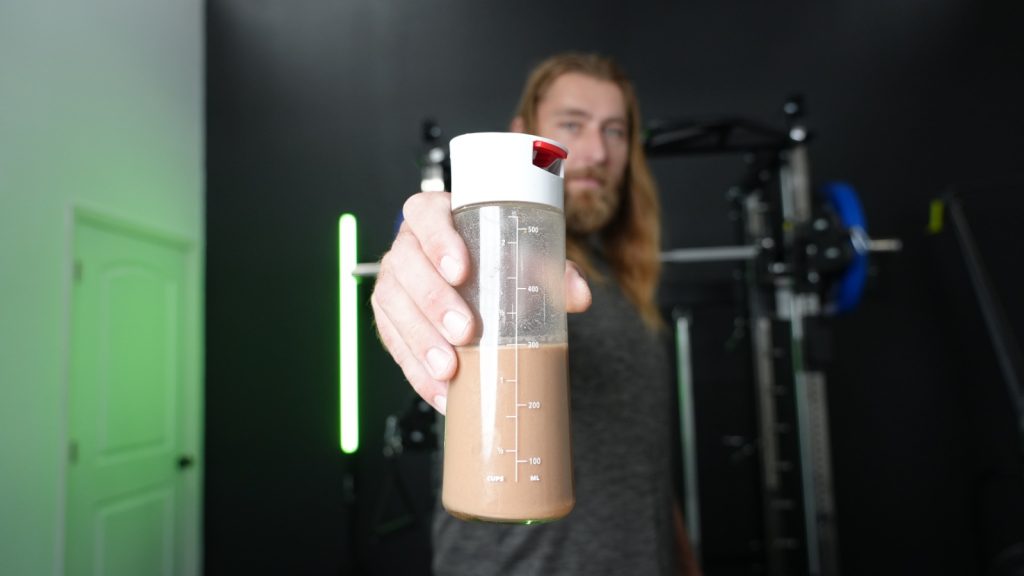
Manufacturers also sometimes sneak in ingredients like artificial sweeteners or flavors to enhance the taste and texture. But, those don’t align with the goal of a high-quality, nutritious supplement and may not align with your preferences if you prefer natural ingredients. Instead, look for powders that use simple, recognizable ingredients that actually boost the nutritional profile, like organic cocoa or natural vanilla. These additions can provide great flavor without compromising the integrity of the product.
Your Specific Nutrition Needs and Dietary Preferences
You’ll want to assess whether the protein powder meets your specific dietary needs and lifestyle preferences. Are you following a vegan or plant-based diet? Make sure the protein source is plant-based, like pea or rice protein. If you are relying on protein powder as a primary protein source, make sure the source ideally has several protein sources to make up a “complete protein” – which means it contains all essential amino acids.
Dealing with any food allergies or intolerances? Check for certifications that show that it’s free of common allergens like soy, nuts, or gluten.
Think about what your individual health goals are. Are you looking to build muscle? Support energy levels? Complement a keto diet? Different protein powders are formulated to cater to different needs, so find one that aligns well with your personal objectives.
Third-Party Certification
Since the supplement industry isn’t as regulated by the FDA as we might hope, third-party certifications become incredibly important when selecting a protein powder to check for purity and safety. These independent organizations like the USDA for organic certification or NSF for overall safety standards put the products through rigorous testing. They check things like whether the ingredients truly match what’s listed, if the product is free from harmful contaminants, and if the manufacturing processes meet high-quality standards.
[Related: Dirty Bulking Vs. Clean Bulking — How Do You Want to Get Big?]
These certifications give you that extra layer of assurance that what you’re consuming is safe and as natural as advertised. You don’t want to risk ingesting anything questionable, especially when it comes to a supplement you’re relying on to support your health and fitness goals. The third-party stamps of approval are like a seal of trustworthiness.
Other Practical Considerations
Of course, once you’ve narrowed down the options based on the nutrition profile and ingredient quality, there are a few more practical factors to consider. If important to you, consider the price per serving, mixability, and taste reviews when choosing a product. First, take a look at the price per serving. The most expensive powder isn’t necessarily the best – you want to find that sweet spot of quality and value. Budgets vary, so find one that fits your spending parameters without sacrificing the nutritional benefits.
Mixability is another important factor, especially if you plan to blend the powder into smoothies or shakes regularly. You don’t want a gritty, clumpy mess – look for reviews that highlight how smoothly it mixes into different liquids including water, milk, and non-dairy beverages.
And finally, taste is crucial. If you don’t enjoy the flavor, you’re much less likely to stick with it in the long run. Some people prefer a neutral, unflavored powder, while others enjoy something a little sweeter. Reading taste reviews can give you a good sense of whether the flavor profile aligns with your personal preferences. Or, if you can find a single pack of a protein powder you’ve been wanting to try, you can see if you like it before you buy a whole tub.
Organic Protein Powders FAQs
Are organic protein powders healthy?
Yes, organic protein powders can be healthy. While organic protein powders are not inherently healthier for you than conventional protein powders from a nutritional standpoint, most of our picks in this review have a balanced macronutrient profile and are great for everyday use.
How much do organic protein powders cost?
Organic protein powders can range quite a bit in price depending on your specific needs. The cheapest organic protein powders can cost as low as $1.16 per serving and are a great value for your money, like the Jacked Factory Authentic Vegan protein on our list. The more expensive organic protein powders can cost as much as $4.29 per serving, like the Vega One Organic All-in-One-Shake. We recommend that you weigh your specific needs against the cost to see if a specific product is worth it.
What is the best organic protein powder?
While what’s considered the best organic protein powder is subjective, we like Transparent Labs Vegan Protein for its high protein count, solid dose of iron, and clean formulation. It’s also gluten-free and non-GMO.
References
- Hulmi, J. J., Lockwood, C. M., & Stout, J. R. (2010). Effect of protein/essential amino acids and resistance training on skeletal muscle hypertrophy: A case for whey protein. Nutrition & Metabolism, 7(1), 1-11.
- Pearson, A. G., Hind, K., & Macnaughton, L.S. (2023). The impact of dietary protein supplementation on recovery from resistance exercise-induced muscle damage: A systematic review with meta-analysis. European Journal of Clinical Nutrition, 77(8), 767-783.
- Moon, J., Koh, G. (2020). Clinical Evidence and Mechanisms of High-Protein Diet-Induced Weight Loss. Journal of Obesity & Metabolic Syndrome, 29(3), 166-173.
- Quinten, T., Philippart, J. M., De Beer, T., Vervarcke, S., & Van Den Driessche, M. (2014). Can the supplementation of a digestive enzyme complex offer a solution for common digestive problems? Archives of Public Health, 72(Suppl 1), 7.
- Nunes, E. A., Colenso-Semple, L., McKellar, S. R., Yau, T., Ali, M. U., Fitzpatrick-Lewis, D., Sherifali, D., Gaudichon, C., Tomé, D., Atherton, P. J., Robles, M. C., Naranjo-Modad, S., Braun, M., Landi, F., & Phillips, S. M. (2022). Systematic review and meta-analysis of protein intake to support muscle mass and function in healthy adults. Journal of Cachexia, Sarcopenia and Muscle, 13(2), 795–810.
- Haider, L. M., Schwingshackl, L., Hoffmann, G., & Ekmekcioglu, C. (2018). The effect of vegetarian diets on iron status in adults: A systematic review and meta-analysis. Critical Reviews in Food Science and Nutrition, 58(8), 1359–1374.
- Pasiakos, S. M., McLellan, T. M., & Lieberman, H. R. (2015). The effects of protein supplements on muscle mass, strength, and aerobic and anaerobic power in healthy adults: a systematic review. Sports Medicine (Auckland, N.Z.), 45(1), 111–131.
- Harvard University. (n.d.). Protein. Harvard T. H. Chan School of Public Health.
- Lönnerdal, B. (1985). Biochemistry and physiological function of human milk proteins. The American Journal of Clinical Nutrition, 42(6), 1299–1317.
- Dos Santos, E. M., Moreira, A. S. B., Huguenin, G. V. B., Tibiriça, E., & De Lorenzo, A. (2023). Effects of Whey Protein Isolate on Body Composition, Muscle Mass, and Strength of Chronic Heart Failure Patients: A Randomized Clinical Trial. Nutrients, 15(10), 2320.
- Bascuñán, K. A., Vespa, M. C., & Araya, M. (2017). Celiac disease: understanding the gluten-free diet. European Journal of Nutrition, 56(2), 449–459.
- Bodke, H., & Jogdand, S. (2022). Role of Probiotics in Human Health. Cureus, 14(11), e31313.
- U.S. Department of Agriculture and U.S. Department of Health and Human Services. Dietary Guidelines for Americans, 2020-2025. 9th Edition.
- Kim J. Y. (2021). Optimal Diet Strategies for Weight Loss and Weight Loss Maintenance. Journal of Obesity & Metabolic Syndrome, 30(1), 20–31.
- Noor, J., Chaudhry, A., Batool, S., Noor, R., & Fatima, G. (2023). Exploring the Impact of the Gut Microbiome on Obesity and Weight Loss: A Review Article. Cureus, 15(6), e40948.
- Ambulkar, P., Hande, P., Tambe, B., Vaidya, V. G., Naik, N., Agarwal, R., & Ganu, (2023). Efficacy and safety assessment of protein supplement – micronutrient fortification in promoting health and wellbeing in healthy adults – a randomized placebo-controlled trial. Translational and Clinical Pharmacology, 31(1),13-27.
- Dhillon, J., Bruce A. Craig, B. A., Leidy, H. J., Amankwaah, A. F., Anguah, K. O., Jacobs, A., Jones, B. L., Jones, J. B., Keeler, C. L., Keller, C. E. M., McCrory, M. A., Rivera, R. L., Slebodnik, M., Mattes, R. D., & Tucker, R. M. (2016). The Effects of Increased Protein Intake on Fullness: A Meta-Analysis and Its Limitations. Journal of the Academy of Nutrition and Dietetics, 116(6), 968-83
- Rakha, A., Mehak, F., Shabbir, M. A., Arslan, M., Ranjha, M. M. A. N., Ahmed, W., Socol, C. T., Rusu, A. V., Hassoun, A., & Aadil, R.M. (2022). Insights into the constellating drivers of satiety impacting dietary patterns and lifestyle. Frontiers in Nutrition, 9, 1002619.
- Song, L. (2017). Calcium and Bone Metabolism Indices. Advances in Clinical Chemistry, 82, 1–46.
- Yao, X., Hu, J., Kong, X., & Zhu, Z. (2021). Association between Dietary Calcium Intake and Bone Mineral Density in Older Adults. Ecology of Food and Nutrition, 60(1), 89–100.
- Vigar, V., Myers, S., Oliver, C., Arellano, J., Robinson, S., & Leifert, C. (2019). A Systematic Review of Organic Versus Conventional Food Consumption: Is There a Measurable Benefit on Human Health?. Nutrients, 12(1), 7.